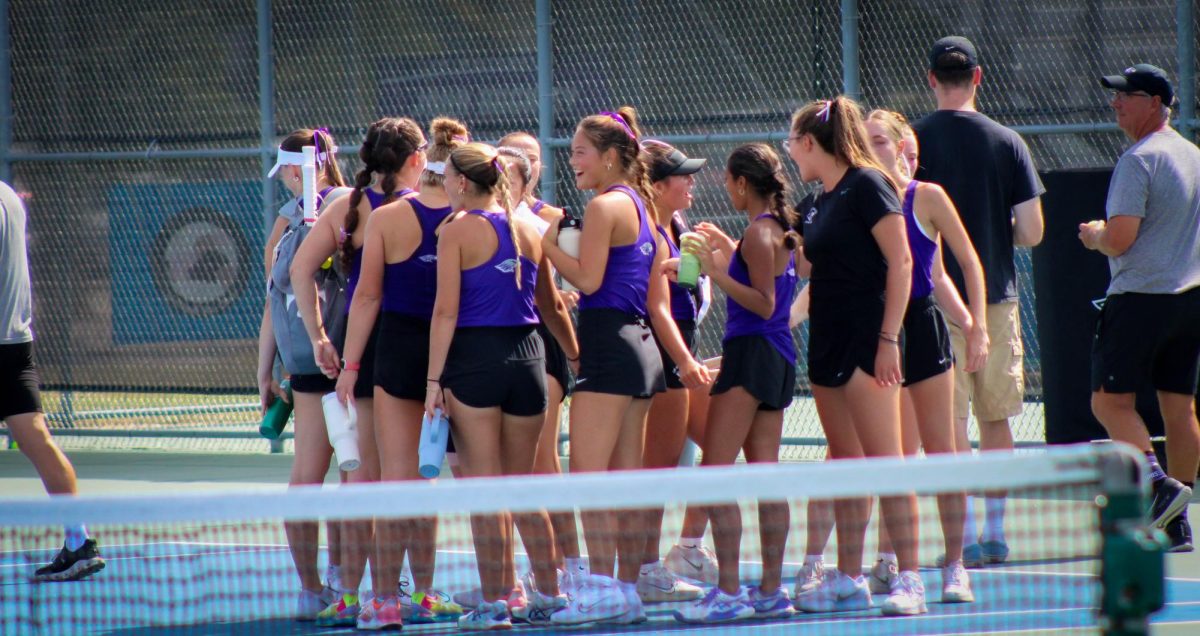The UW-Whitewater women’s tennis team is diving head first into the second half of its season with a very tough schedule. The Warhawks will open their indoor campaign against three straight opponents from higher divisions: Division I teams UW-Milwaukee and Northern Illinois, along with Division II Roosevelt University. While some programs might ease back into competition after the fall, Whitewater head coach Frank Barnes believes in taking the road less traveled.
Facing these teams provides an early-season challenge that forces the Warhawks to elevate their play immediately, helping them shake off any rust and adjust to a higher level of competition.
“We started doing that maybe 10 years ago, starting the second season with really good teams, but it won’t affect us if we’re not quite ready,” Barnes said. “Scheduling strong teams challenges us, but losing to Division I or II teams doesn’t hurt us. The women are excited to play them, so practices are strong, and those matches push us.”
Unlike some top Division III programs, Whitewater has a full fall schedule, meaning their spring indoor season starts later. The Warhawks finished the fall season with a 7-1 record and secured their 18th consecutive WIAC championship, demonstrating dominance at the conference level.
However, stepping into competition against Division I and II teams presents a new set of challenges. These programs often feature deeper rosters and players with high-level experience, including international recruits and players with International Tennis Federation points.
The Warhawks use these matches to adapt to different styles of play, preparing them for the heightened level of competition they’ll face in the postseason.
“When we shift to the DIII schedule, the game will feel easier, making it great preparation,” Barnes said. “The second half of the season is against top DIII teams. The fall is more of a conference season, and in spring, we play a national schedule.”
The Warhawks’ difficult early slate continues beyond these three matches. Over spring break, they’ll travel to California for matchups against Chapman University, The College of the Desert and Claremont-Mudd-Scripps, before returning home to compete in the prestigious Midwest Invite – an event featuring some of the best Division III programs in the country, including the University of Chicago, Denison, WashU and Gustavus Adolphus. This schedule mirrors that of other elite Division III programs that aim to prepare their teams for deep NCAA tournament runs. By playing top-tier teams early, the Warhawks ensure they are battle-tested for crucial late-season matches.
One of the key benefits of playing tougher opponents early is testing the team’s strengths and exposing areas for improvement. Barnes particularly wants to see how his players handle high-level doubles play.
“Doubles play is crucial in college tennis because [a match] starts with three doubles matches, and whoever wins the majority gets the doubles point,” Barnes said. “Starting with that lead and energy gives momentum going into singles. If we can hang with them in doubles – where we’re known for being strong in DIII – that would be key.”
In singles play, the Warhawks are focusing on consistency and their ability to extend rallies against opponents who hit harder and play faster than their typical WIAC competition. While Whitewater players may not match the power of some Division I and II opponents, their strategy revolves around resilience, ball placement and forcing errors through steady play. Holding up under pressure and maintaining high shot tolerance will be critical to competing against top-level athletes.
“If our opponents win points by hitting winners, that’s fine, but we’re not giving them anything free,” Barnes said. “We’ll stay in points as long as possible, extend rallies, and make them earn it.”
While these early matches won’t make or break the Warhawks’ season, they are an integral part of their preparation for the ultimate goal – winning the WIAC and making a deep run at nationals. Whitewater has built a tradition of excellence in the WIAC, and these experiences against higher-division programs reinforce their competitive mindset, ensuring they remain sharp when facing top Division III opponents later in the season. “We won the conference in the fall and that was our 18th straight,” Barnes said. “Our biggest goal is to win the conference [automatic qualifier]. To do that, we’ll have to beat the same top teams: La Crosse, Eau Claire and Stevens Point. Winning the AQ qualifies us for nationals, and our goal there is to reach the round of 16.”
Past years have shown that this grueling schedule pays off. Last season, some Warhawk players found success against their Division I and II opponents, with Cassie Lee winning both of her singles matches against Division I competition. That experience translated into success later in the season, as the team learned how to handle pressure situations and adapt to a faster-paced match.
“Competing against top DI players, and sometimes winning, is huge,” Barnes said. “We’ve also had success in doubles, sometimes taking the doubles point or winning a match. The real success is building confidence. Just scheduling these matches gets the team excited for weeks, making practices better because they know they have to be ready.”
As the Warhawks embark on this tough stretch of matches, their focus remains on the bigger picture – using these early-season battles to fuel a run at another title at the WIAC Final Four NCAA AQ Tourney and earn a spot in the NCAA tournament.
Whitewater’s indoor season will start March 2 against Division I UW-Milwaukee in Lake Geneva.



